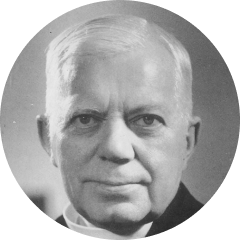George Bell
(1883–1958)
George Bell (1883–1958): Bishop of Chichester, 1929–58; President of the Religious Drama Society of Great Britain from its foundation in 1929; chairman of the Universal Christian Council for Life and Work, 1934–6; President of the World Council of Churches from 1954 – he has been called both a true ‘world churchman’ and ‘the father of modern religious drama’. Though shy, modest and soft-spoken, he was a man of uncompromising conscience, courage and energetic commitment, especially to the work of international ecumenism and the place of the Church in public life. ‘Not for me’, he said, ‘a fugitive and cloistered Church, which refuses to face the problems and crises of the modern world’. In 1944 his denunciation in the House of Lords of the Allied policy of bombing cities and civilian homes in Germany caused much resentment: his stance was believed to have dashed his chances of succeeding William Temple as Archbishop of Canterbury later that year. His works include Randall Davidson, Archbishop of Canterbury (2 vols, 1935) and Christianity and World Order (1940). In 1935 Bell invited TSE to write for the Canterbury Festival the play that would turn out to be Murder in the Cathedral. See Ronald C. D. Jasper, George Bell: Bishop of Chichester (1967); Kenneth Pickering, Drama in the Cathedral: A Twentieth Century Encounter of Church and Stage (1986, 2001); Andrew Chandler, George Bell, Bishop of Chichester: Church, State, and Resistance in the Age of Dictatorship (2016).
